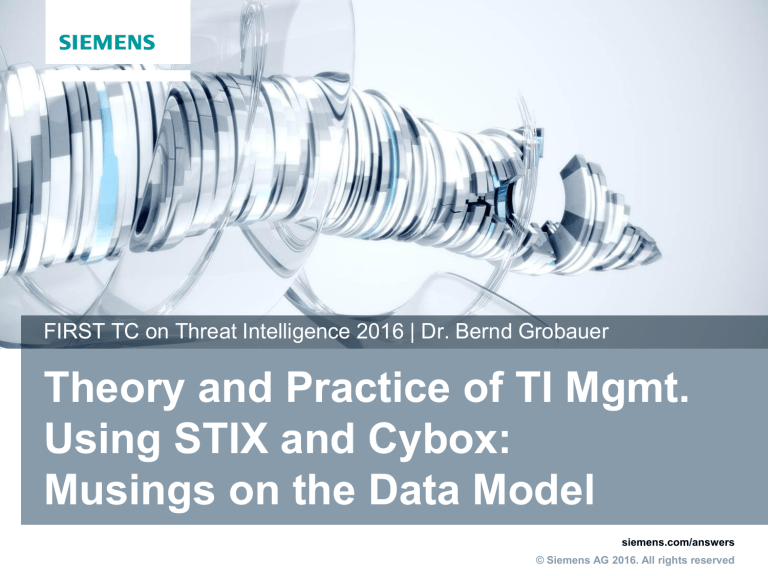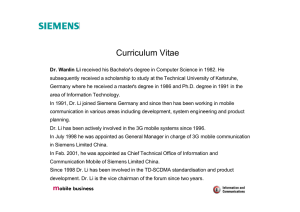
FIRST TC on Threat Intelligence 2016 | Dr. Bernd Grobauer
Theory and Practice of TI Mgmt.
Using STIX and Cybox:
Musings on the Data Model
siemens.com/answers
© Siemens AG 2016. All rights reserved
A slide from FIRST 2014 (Boston)
Page 2
February 2016
Siemens CT RDA ITS
© Siemens AG 2016. All rights reserved
A slide from FIRST 2014 (Boston)
Page 3
February 2016
Siemens CT RDA ITS
© Siemens AG 2016. All rights reserved
A slide from FIRST 2014 (Boston)
Page 4
February 2016
Siemens CT RDA ITS
© Siemens AG 2016. All rights reserved
A slide from FIRST 2014 (Boston)
Page 5
February 2016
Siemens CT RDA ITS
© Siemens AG 2016. All rights reserved
STIX Layer
MANTIS STIX Layer
Turn STIX/CybOX XML into
interconnected „InfoObjects“
STIX
XML
Each „InfoObject“ represented by list of „facts“ that
closely reflect XML structure
Page 6
February 2016
Siemens CT RDA ITS
© Siemens AG 2016. All rights reserved
Relationships and Facts in STIX/CybOX
If you look at STIX and CybOX, you see that XML’s hierarchical
structure is used for two different purposes:
modeling of containment relations between different objects
Observable
Event
Action
File
structuring of facts
Filename
Filepath
Hashes
Hash Type
Value
Page 7
February 2016
MD5
6E48C3…
Siemens CT RDA ITS
Example: A CybOX Observable XML Source
Page 8
February 2016
Siemens CT RDA ITS
Example: Importing a CybOX 2.0 Observable
XML Source: Focusing on objects and facts
Observed event: An action that creates a file with certain file name, file path and hash
Page 9
February 2016
Siemens CT RDA ITS
Example: A CybOX Observable XML Source
Extracting „flat“ facts from hierarchical XML
The facts we are really interested into about the observed file are:
• Properties/File_Name = foobar.dll
• Properties/File_Path = C:\Windows\system32
• Properties/Hashes/Hash/Type = MD5
10
February 2016
Siemens CT RDA ITS
• Page
Properties/Hashes/Hash/Simple_Hash_Value
= 6E48C34D74A931EC2CE90ABD7DAC6A
Relationships and Facts in STIX/CybOX
If you look at STIX and CybOX, you see that XML’s hierarchical
structure is used for two different purposes:
modeling of containment relations between different objects
This leads
Observable
Event
Action
File
structuring of facts
to nodes
and edges
Filename
Filepath
This leads
Hashes
Hash Type
Value
Page 11
February 2016
MD5
6E48C3…
Siemens CT RDA ITS
to facts about
a node
Observable
Cybox 2.0
Fact 1
Fact n
Info Object
Fact 1
Fact n
…
Observable
Info Object
…
Cybox 2.0
Correlation by Facts using the MANTIS data model
Properties/Hashes/Hash/SimpleHashValue=6E48C3… is
shared between two different InfoObjects
Page 12
February 2016
Siemens CT RDA ITS
© Siemens AG 2016. All rights reserved
STIX-Layer feature of MANTIS:
Correlation on facts
Page 13
February 2016
Siemens CT RDA ITS
© Siemens AG 2016. All rights reserved
STIX-Layer feature of MANTIS:
„Fact-based“ Tagging
Page 14
February 2016
Siemens CT RDA ITS
© Siemens AG 2016. All rights reserved
STIX
XML
Page 15
February 2016
STIX Layer
The GUI Problem
Siemens CT RDA ITS
© Siemens AG 2016. All rights reserved
The GUI Problem …
Page 16
February 2016
Siemens CT RDA ITS
© Siemens AG 2016. All rights reserved
MANTIS‘ GUI approach
Page 17
February 2016
Siemens CT RDA ITS
© Siemens AG 2016. All rights reserved
The GUI Problem:
Now we have two layers
STIX Layer
GUI
GUI
JSON
Page 18
February 2016
Siemens CT RDA ITS
© Siemens AG 2016. All rights reserved
The GUI Problem: Now we have two layers
Analyst has two views on the
same data
Authoring view
STIX-based view
Consequences:
This adds some complexity and
makes lives of users/analysts
harder than woudl be the case for
directly working on the model
Danger of divergencies between
GUI layer and STIX layer if
subsequent import after changes is
not carried out
Page 19
February 2016
Siemens CT RDA ITS
© Siemens AG 2016. All rights reserved
The GUI Problem: Now we have two layers
Only „own“ GUI-made reports can
be edited via GUI
You CANNOT work on a report
received as STIX XML, since there
is no way back from STIX to „GUI
JSON“
You could think about „per
entity/object“ editing support
(which allows you to edit the
entity/object „features“ the GUI
author chose to implement … but
the more features you support, the
more complicated things get again.
Page 20
February 2016
Siemens CT RDA ITS
© Siemens AG 2016. All rights reserved
The „making stuff actionable“ problem
STIX Layer
GUI
GUI
JSON
?
Page 21
What are the „top“ needles (IPs, URLs, Hashes, …) I want to
look for in my haystack?
February 2016
Siemens CT RDA ITS
© Siemens AG 2016. All rights reserved
The STIX/CybOX Duplication/Multiplication Problem:
Munich CERT has observed 192.168.1.13
UID
Namespace: munich.de
Page 22
February 2016
Siemens CT RDA ITS
Others have observed 192.168.1.13 as well (Berlin
CERT even four times in four different reports)
Page 23
February 2016
Siemens CT RDA ITS
To get anywhere close to finding your top needles,
you need some canoncial representation of your
needles
192.168.1.13
Page 24
February 2016
Siemens CT RDA ITS
How to solve this?
Here, I was lead into TEMPTATION … and
succumbed
Page 25
February 2016
Siemens CT RDA ITS
I could have resisted the temptation and used a
CybOX object as canonical representation …
MANTIS a3fc…
Page 26
February 2016
Siemens CT RDA ITS
… but I succumbed and created a new database table
for „simplistic observables“ …
Type
Subtype
IP v4
Page 27
February 2016
Siemens CT RDA ITS
Value
192.168.1.13
… and *BANG*, we have a third layer with a new data
model!
GUI
Layer
GUI
JSON
STIX
Layer
STIX
Actionables
Layer
XML
Page 28
February 2016
Siemens CT RDA ITS
Type
IP
Subtype
v4
Value
192.168.1.13
…
© Siemens AG 2016. All rights reserved
A closer look at the basics of the MANTIS
Actionables Layer
Each „basic indicator“
represented exactly once in
„key-value“ form
Page 29
February 2016
Siemens CT RDA ITS
© Siemens AG 2016. All rights reserved
A closer look at the basics of the MANTIS
Actionables Layer
Basic
IntelFusion/Correlation
occurs automatically: a
simple query shows in
which reports a certain
basic indicator occured
Page 30
February 2016
Siemens CT RDA ITS
© Siemens AG 2016. All rights reserved
A closer look at the basics of the MANTIS
Actionables Layer
Contextual information
about Indicator, Threat
Agent, Campaign etc.
represented in JSON-form;
data model is such that we
always know, which report
made which assertion …
Page 31
February 2016
Siemens CT RDA ITS
© Siemens AG 2016. All rights reserved
A closer look at the basics of the MANTIS
Actionables Layer
Strutured tags (consisting of
context and tag info) allow us
to record per-observable
information that is grouped
into „investigation contexts“
Page 32
February 2016
Siemens CT RDA ITS
© Siemens AG 2016. All rights reserved
A closer look at the basics of the MANTIS
Actionables Layer
Keep track of CybOX object
contexts (e.g., filename and
hash part of the same CybOX
object) and object relations
Page 33
February 2016
Siemens CT RDA ITS
© Siemens AG 2016. All rights reserved
Here is a headache:
STIX
Layer
STIX
Actionables
Layer
XML
Page 34
GUI
JSON
GUI
Layer
Unexpected
things can happen
Analysts now
have three views..
February 2016
Siemens CT RDA ITS
Type
IP
Subtype
v4
Value
192.168.1.13
…
© Siemens AG 2016. All rights reserved
So we are probably moving towards the following:
Midterm:
STIX Layer
STIX
XML
Actionables
Layer
GUI
Page 35
February 2016
Siemens CT RDA ITS
Type
IP
Subtype
v4
Value
192.168.1.13
…
© Siemens AG 2016. All rights reserved
So we are probably moving towards the following:
Longterm:
STIX
GUI
Actionables
Layer
XML
Type
IP
Subtype
v4
Value
192.168.1.13
…
Possible Strategy for long term development: „Mantis in MISP“:
MISP already has
key-value pair representation of basic indicators
machine tags
MISP currently lacks (but has lot‘s of this on the roadmap):
per-indicator tagging
structured way to represent contextual information and „object containment“ from
STIX entities
single representation of basic indicators (and thus „fusion/correlation for free“)
Page 36
February 2016
Siemens CT RDA ITS
© Siemens AG 2016. All rights reserved
Conclusions
Using STIX 1.x/CybOX 2.x „directly“ as data model rather than data exchange
model is hard:
Requirements for use-case support / templating are likely to lead to a separate
GUI layer
Chances are that you end up with a second, internal data model (and third layer)
that helps you deal with what is really actionable
STIX 2.x/CybOX 3.x may make „direct“ usage easier, but still:
YOUR USECASE SOLVING YOUR PROBLEM comes FIRST!!!
MANTIS is doing more and more based on a data model that
represents „simple observable“ / „basic indicators“ as key value pairs
supports basic fusion/correlation „for free“ by deduplicating basic indicators
bases the analysts‘ work in „investigation contexts“
We are evaluating the possibility of a „Mantis in MISP“ approach
MISP well-established in indicator sharing with broad user base in Europe and
excellent code maintenance / further development
MISP roadmap looks like „Mantis in MISP“ is a realistic possibility
Page 37
February 2016
Siemens CT RDA ITS
© Siemens AG 2016. All rights reserved


